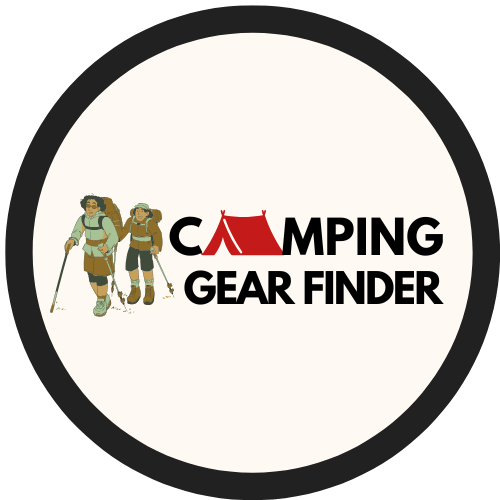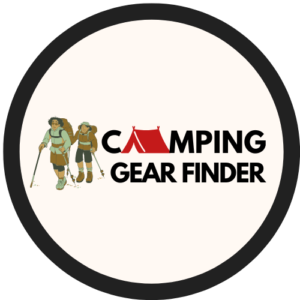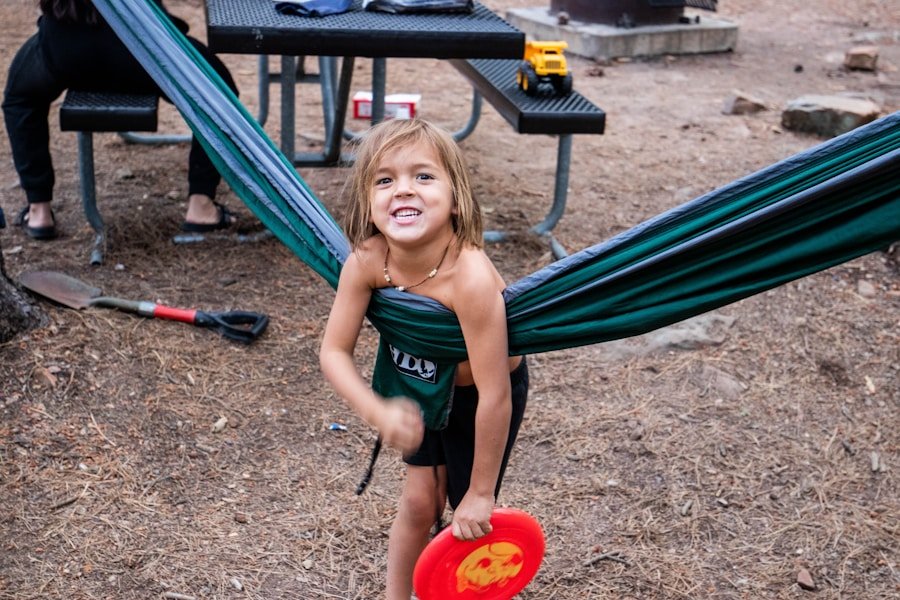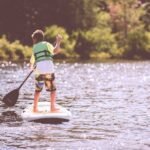When preparing for a hiking and camping trip, it is essential to have the right gear to ensure a safe and enjoyable experience. One of the most important items to bring is a sturdy backpack to carry all of your essentials. Look for a backpack with multiple compartments and adjustable straps for a comfortable fit.
Additionally, a reliable pair of hiking boots is crucial for navigating rugged terrain. Choose boots with good ankle support and a durable sole to protect your feet from rocks and roots. A lightweight and waterproof tent is also essential for camping, providing shelter from the elements and a comfortable place to rest at night.
Look for a tent that is easy to set up and spacious enough for your needs. Another essential piece of gear for hiking and camping is a quality sleeping bag. Look for a sleeping bag that is suitable for the climate you will be camping in, with insulation to keep you warm on chilly nights.
A portable water filter or purification system is also crucial for staying hydrated during your outdoor adventures. Look for a lightweight and easy-to-use option that can remove bacteria and protozoa from natural water sources. Finally, a reliable headlamp or flashlight is essential for navigating in the dark and finding your way around the campsite.
Look for a headlamp with adjustable brightness settings and a long battery life to ensure you have enough light for your entire trip.
Key Takeaways
- Essential gear for hiking and camping includes a backpack, tent, sleeping bag, and a multi-tool.
- Proper clothing and footwear for outdoor adventures should include moisture-wicking layers, sturdy hiking boots, and a waterproof jacket.
- Food and cooking supplies for a successful trip should include lightweight, high-energy snacks, a portable stove, and a mess kit.
- Shelter and sleeping essentials for camping should include a durable tent, sleeping pad, and a warm sleeping bag.
- Safety and first aid supplies for hiking and camping should include a first aid kit, emergency whistle, and a map and compass for navigation.
Clothing and Footwear for Outdoor Adventures
When it comes to clothing and footwear for hiking and camping, it is important to be prepared for a variety of weather conditions. Start with a moisture-wicking base layer to keep sweat away from your skin and regulate your body temperature. Look for lightweight and breathable materials that will keep you comfortable during physical activity.
A durable and quick-drying pair of hiking pants is also essential for outdoor adventures, providing protection from brush and insects while allowing for freedom of movement. Additionally, a waterproof and windproof jacket is crucial for staying dry and warm in inclement weather. Look for a jacket with adjustable cuffs and a hood to keep out the elements.
In terms of footwear, a reliable pair of hiking socks is essential for preventing blisters and keeping your feet dry. Look for socks made from merino wool or synthetic materials that wick away moisture and provide cushioning in key areas. A sturdy pair of hiking boots is also crucial for navigating rough terrain and providing support for your ankles.
Look for boots with a waterproof membrane and a grippy sole to provide traction on slippery surfaces. Finally, a wide-brimmed hat and sunglasses are essential for protecting your face and eyes from the sun’s harmful rays. Look for a hat with UPF protection and sunglasses with polarized lenses to reduce glare.
Food and Cooking Supplies for a Successful Trip
Proper nutrition is crucial for staying energized during a hiking and camping trip, so it is important to bring the right food and cooking supplies. Start by packing lightweight and non-perishable foods such as trail mix, energy bars, and dehydrated meals. These items are easy to pack and provide essential nutrients for sustained energy on the trail.
Additionally, bring a portable stove or campfire cooking equipment to prepare hot meals at the campsite. Look for a lightweight and compact stove that is easy to use and fuel-efficient. A set of cookware, including pots, pans, and utensils, is also essential for preparing meals in the backcountry.
In terms of hydration, it is important to bring an adequate supply of water as well as a way to purify natural water sources. Bring a durable water bottle or hydration reservoir to carry water on the trail, as well as a portable water filter or purification tablets to treat water from streams and lakes. Additionally, bring a cooler or insulated bag to keep perishable items such as fresh produce and meat cold during your trip.
Finally, don’t forget to pack plenty of snacks to keep you fueled throughout the day, such as nuts, dried fruit, and jerky. By bringing the right food and cooking supplies, you can ensure that you have the energy you need to enjoy your outdoor adventures.
Shelter and Sleeping Essentials for Camping
| Item | Quantity | Reason |
|---|---|---|
| Tent | 1 | To provide shelter |
| Sleeping bag | 1 | To keep warm at night |
| Backpack | 1 | To carry essentials |
| Water bottle | 1 | To stay hydrated |
| Food | As needed | To provide energy |
| Map and compass | 1 each | To navigate the trails |
| First aid kit | 1 | For emergencies |
| Flashlight | 1 | For visibility at night |
When it comes to shelter and sleeping essentials for camping, it is important to have the right gear to ensure a comfortable night’s rest. Start with a durable and waterproof tent that is suitable for the number of people in your group. Look for a tent with ample ventilation and a rainfly to keep you dry in wet weather.
Additionally, bring a ground tarp or footprint to protect the bottom of your tent from sharp objects and moisture. A quality sleeping bag is also essential for staying warm at night, so look for one that is rated for the temperatures you expect to encounter on your trip. In addition to a sleeping bag, bring a sleeping pad or air mattress to provide cushioning and insulation from the ground.
Look for a lightweight and compact option that is easy to inflate and provides adequate support for your back. A portable camping pillow is also essential for providing neck support and ensuring a good night’s sleep. Finally, bring any additional items that will help you sleep comfortably, such as earplugs, an eye mask, or a portable fan.
By bringing the right shelter and sleeping essentials, you can ensure that you have a restful night’s sleep during your camping trip.
Safety and First Aid Supplies for Hiking and Camping
Safety should always be a top priority when preparing for a hiking and camping trip, so it is important to bring the right first aid supplies and safety equipment. Start by packing a comprehensive first aid kit that includes bandages, gauze, antiseptic wipes, tweezers, pain relievers, and any necessary prescription medications. Additionally, bring any personal protective equipment such as gloves or masks that may be needed in an emergency situation.
It is also important to bring a map and compass or GPS device to help navigate in unfamiliar terrain. In terms of safety equipment, bring a whistle or signaling device to attract attention in case of an emergency. Additionally, bring a multi-tool or knife that can be used for various tasks such as cutting rope or preparing food.
It is also important to bring any necessary permits or licenses for the area where you will be hiking or camping, as well as any relevant wildlife safety information. By being prepared with the right first aid supplies and safety equipment, you can ensure that you are ready to handle any unexpected situations that may arise during your outdoor adventures.
Navigation and Communication Tools for Outdoor Exploration
When venturing into the wilderness for hiking and camping, it is important to have the right navigation and communication tools to ensure that you can find your way and stay connected with others if needed. Start by bringing a map of the area where you will be hiking or camping, as well as a compass or GPS device to help navigate unfamiliar terrain. It is important to familiarize yourself with the map and any relevant landmarks before setting out on your trip.
Additionally, bring a fully charged cell phone or satellite communication device in case of an emergency. In terms of communication tools, it is important to let someone know your itinerary before heading out on your trip. Provide them with details about where you will be hiking or camping, as well as when you expect to return.
It is also important to check in with them periodically if possible, especially if you will be out of cell phone range. Finally, consider bringing a two-way radio or signaling device such as flares or a mirror in case you need to attract attention in an emergency situation. By being prepared with the right navigation and communication tools, you can ensure that you can find your way and stay connected during your outdoor exploration.
Additional Considerations for a Comfortable and Enjoyable Trip
In addition to the essential gear mentioned above, there are several additional considerations that can help make your hiking and camping trip more comfortable and enjoyable. Start by bringing a lightweight and packable chair or hammock to relax at the campsite after a long day of hiking. Look for options that are easy to set up and provide comfortable seating or lounging options.
Additionally, consider bringing entertainment such as books, games, or musical instruments to enjoy during downtime at the campsite. It is also important to consider personal hygiene when preparing for a hiking and camping trip. Bring biodegradable soap, hand sanitizer, and toilet paper to maintain cleanliness while in the backcountry.
Additionally, consider bringing a portable shower or wet wipes to freshen up after long days on the trail. Finally, consider bringing items that will enhance your overall experience, such as a camera or binoculars to capture the beauty of nature around you. By considering these additional factors, you can ensure that you have a comfortable and enjoyable trip while hiking and camping.
In conclusion, preparing for a hiking and camping trip requires careful consideration of essential gear such as clothing, footwear, food, shelter, safety equipment, navigation tools, and additional considerations for comfort. By being prepared with the right gear and supplies, you can ensure that you have an enjoyable outdoor adventure while staying safe and comfortable in the wilderness. Whether you are embarking on a day hike or an extended backpacking trip, taking the time to prepare properly will help ensure that you have everything you need for a successful outdoor experience.
FAQs
What are the essential items to bring on a hiking and camping trip?
Essential items to bring on a hiking and camping trip include a tent, sleeping bag, sleeping pad, backpack, water bottles or hydration system, food and snacks, cooking supplies, a map and compass, first aid kit, appropriate clothing, and a multi-tool or knife.
What type of clothing should be packed for a hiking and camping trip?
Clothing for a hiking and camping trip should include moisture-wicking base layers, insulating layers, a waterproof and windproof jacket, hiking pants, hiking boots, wool socks, a hat, and gloves. It’s important to pack clothing suitable for the expected weather conditions.
What food and cooking supplies should be brought on a hiking and camping trip?
Food and cooking supplies for a hiking and camping trip should include lightweight and non-perishable items such as dehydrated meals, trail mix, energy bars, and instant coffee. Cooking supplies may include a portable stove, fuel, a pot or pan, utensils, and biodegradable soap for cleaning.
What safety items should be included in a hiking and camping trip packing list?
Safety items to include in a hiking and camping trip packing list are a first aid kit, a map and compass, a multi-tool or knife, a headlamp or flashlight with extra batteries, a whistle, and a fire starter. It’s also important to have a plan for emergency communication and to let someone know your itinerary.
What are some optional items to consider bringing on a hiking and camping trip?
Optional items to consider bringing on a hiking and camping trip may include a camera, binoculars, a portable water filter or purification tablets, a lightweight camp chair, a portable solar charger, and a book or journal for relaxation and entertainment.













